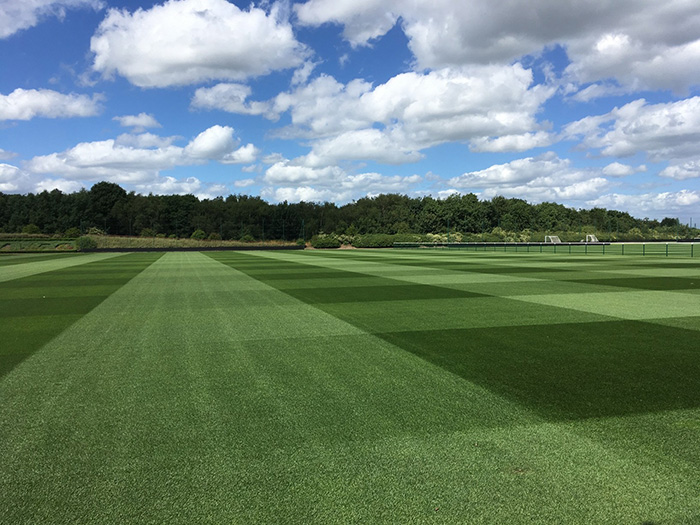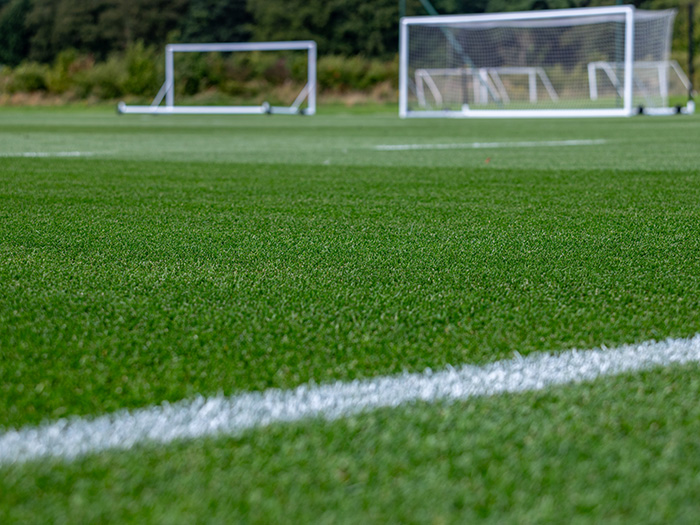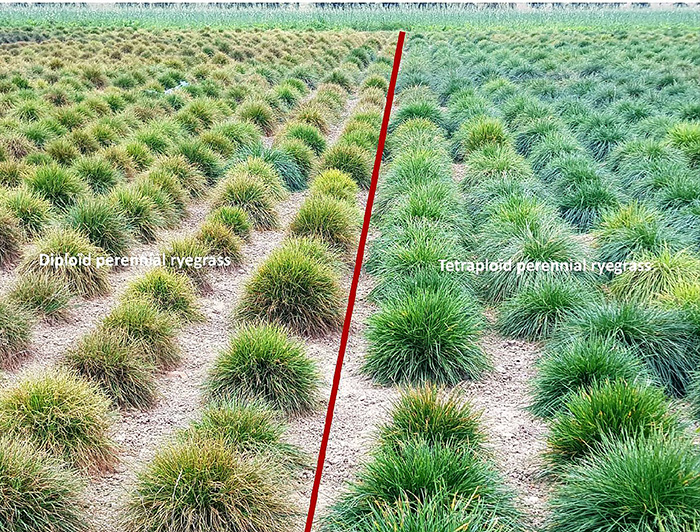A Grass For All Seasons – Understanding Tetraploid Technology

Written by: Jayne Leyland, Portfolio Director, Origin Amenity Solutions.
A new generation of amenity tetraploid perennial ryegrasses offer unparalleled qualities for sports pitches and playing fields, with proven benefits in addition to wear tolerance such as cold temperature growth, fast recovery, high root mass and superior stress tolerance. If you have not yet discovered tetraploids, how and why are they so exceptional?

Energised – increased cellular chloroplast benefits the plant by boosting chlorophyll production for energy absorption and processing. The outcome is a high energy, robust, hard‑wearing, healthier plant with improved stress tolerance and recovery capability, even in cooler temperatures.
Robust development – a tetraploid cultivar begins its’ journey as seed selected from an amenity diploid cultivar with desirable characteristics. A few grammes is treated with a natural plant hormone (colchicine) which doubles the chromosomes. The resultant tetraploids produce larger, high‑energy seeds from which plants are grown and multiplied in isolation.
It may take several generations of tetraploid offspring to yield stable, viable seed for use in field testing. Potential new cultivars are pushed to the limit and vital characteristics such as growth habit, wear, disease and drought tolerance, mowing height and visual merit are assessed. Only one or two cultivars from early selections make it through this rigorous process and those successful candidates must conform to DUS protocols, that being distinct, uniform and stable. Research into the benefits of tetraploids continues at Origin Amenity Solutions Research Centre. Ask us about the outcomes to date!

In the dark – Double chloroplast also increases tetraploids’ capability to harness relatively more light, beneficial where light quality is poor such as overcast conditions, shorter day length and in shade where temperatures are relatively cooler. Origin Amenity Solutions and breeding partner Top Green routinely assesses all tetraploid cultivars in a shade and wear trial under reduced light levels at the Research Station in France. This characteristic makes them especially valuable for sports pitches in mixes such as 4Tetra, R140 and Sports Field Renovation.

Fast establishment is a major benefit not only during the winter months but any time of year. Under such intense wear pressure, the speed of emergence and high root mass helps restore a surface in the shortest possible time, making 4Tetra, R140 and Sports Field Renovation perfect options for pitch repairs and renovation at any time of year.
Hot stuff – High root mass and deep rooting means tetraploids deliver greater drought tolerance and stability. Vital for heat survival, they are the first and fastest to recover from a prolonged period of heat and drought stress, an ideal choice for free‑draining soils and sites exposed to full sun or without irrigation.
Toughen up – High disease pressure can be devastating to the performance and visual qualities of the playing surface. Selecting cultivars with high disease tolerance is an important part of an integrated management approach.
Whilst selected cultivars can provide degrees of tolerance but not resistance, the official testing programme for the GEVES European Turf Testing Programme highlights improved tolerance to a range of common turf diseases. What’s more, they are the fastest to establish for repairs following a disease attack such as Gray Leaf Spot.

Go‑To Choice
The use of tetraploids for construction, renovation and repair of pitches and playing fields has rocketed in recent years. Their dramatic rise in popularity is fundamentally down to proven performance and flexibility for wide‑ranging applications right throughout the year. Blended with diploid ryegrasses for pitches or mixed with fescues for playing fields, they are reliable performers that always deliver.
For more information on the extended choice of R Range tetraploid technology mixes contact Origin Amenity Solutions on 0800 138 7222 or visit www.originamenity.com
Click the article to enlarge it.











































